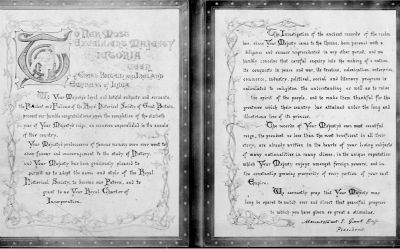The Royal Historical Society was founded in 1868 as part of the great Victorian boom in associational life. Like the Royal Geographical Society (founded 1830) and the Royal Archaeological Institute (1844), it came together at a turning-point in the professionalisation of knowledge, combining amateur scholars with a growing number of full-time professional historians, based in universities, archives and museums.
By the 1890s the Society was taking on more public, professional responsibilities – organising national events (such as the Domesday Commemoration of 1886), overseeing the teaching of history in schools and universities, and working closely with the British Museum and the Public Record Office – a tradition that continues today, with the British Library and The National Archives.
Camden Society merger
By 1897 the Society had become a fixture in the national organisation of historical research. In that year the Camden Society, an older society dedicated to the publishing of edited primary sources in English history (founded 1838), chose to amalgamate with the RHS.
The RHS continues to publish the Camden Series to this day. The Bibliography of British History, (now the Bibliography of British and Irish History), originates from the same period. The Society’s journal, Transactions of the RHS dates from 1872 and marks its 150th year in 2022.
20th-century development

Applications for the RHS Fellowship, 1918
For much of the twentieth century the Society was a typical learned society, devoted to cultivating its discipline with a programme of publications, conferences and other stimuli to research, and maintaining its own library and meeting rooms – peripatetically around London until installed in 1967 at University College London.
Its membership became more academic, but always maintained a number of ‘amateur’ scholars, as well as professionals engaged in advanced historical research in libraries, archives, museums and other institutions. For this reason election to the Fellowship has always been open to anyone who can show through publication or otherwise a record of achievement in historical research, regardless of employment status.

G.W. Prothero, President, 1901-5, after whom the annual Prothero Lecture is named (c) NPG, London, CC BY-ND-NC 3.0.
Reflecting the nature of historical research in Britain, its membership and leadership were originally rooted in English history, and especially medieval history, but have gradually diversified over time, a shift marked in 1964 by the election of the first non-European historian to the presidency, the distinguished Latin Americanist, Robin Humphreys.
RHS Presidents are prominent historians who serve for four year terms; the first President was appointed in 1872, the latest (and 35th) in November 2020: Past Presidents of the Royal Historical Society.
Government involvement
Since the 1960s, government has involved itself increasingly in the organisation of historical research in universities, and accordingly the Royal Historical Society has engaged more closely with government, working on behalf of historical researchers.
During the ‘run-down’ of universities in the early years of the Thatcher governments of the 1980s, a History in the Universities Defence Group was set up by university departments who felt that the RHS had not moved quickly enough to take on these new responsibilities, but since the 1990s the Society has emerged again as the principal voice for historians in matters of public debate.
Policy influence
Topics on which the Royal Historical Society has taken a position have ranged from Freedom of Information to the 30-year-rule governing the release of public records; from the policies of the research and university funding councils to the efforts of government departments to open up academic research to public impact and scrutiny.
Working closely with the Historical Association, the Society has also helped to bridge the gap between schools and universities. One of its past Presidents, Peter Marshall, was on the working group that drafted the first national curriculum for history in the late 1980s, and in recent years its officers have again played a prominent role in the re-drafting of the national curriculum (and criteria for GCSE and A-Level).
The Royal Historical Society today

RHS Publish History Awards
Today the Society continues to fulfil its traditional roles as a learned society alongside this more public role as tribune for history in all its manifestations, and an advocate for the discipline and profession.

2021 Online Workshop for ECR Historians, from the RHS Council Chamber
In the early 2020s, the Society’s work focuses on the following areas: advocacy and policy research; events and training; publishing; grants and research support, especially for early career historians; awards and professional recognition; and the RHS Library and Archive which records the development of the UK’s historical profession.
More about the RHS today >












